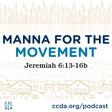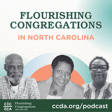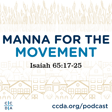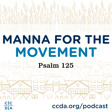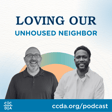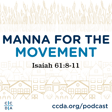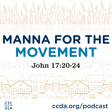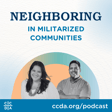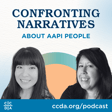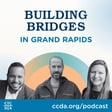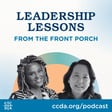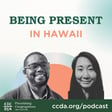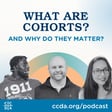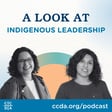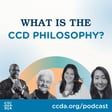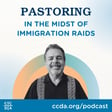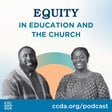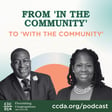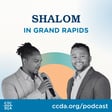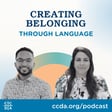Become a Creator today!Start creating today - Share your story with the world!
Start for free
00:00:00
00:00:01

BONUS: Learning From Our Indigenous Family
In this episode, you will hear from a panel of Native speakers as they consider what it means to be home. You will hear from JR Lilly, Lenore Three Stars, Edith Woodley, Randy Woodley, and Corey Greaves as they share their wisdom with us.
Learn more at ccda.org/indigenous.
Connect with Lenore on her website: lenorethreestars.com.
Learn more about Randy and Edith's work at eloheh.org.
Connect with Corey and his organization at mendingwings.net.
Connect with CCDA on Instagram, Twitter, Facebook, and LinkedIn. Follow CCDA on YouTube.
Recommended
Transcript
Introduction and Overview
00:00:09
Speaker
Welcome to the CCDA Podcast.
00:00:12
Speaker
In this episode, you will hear from a panel of native speakers as they consider what it means to be home.
00:00:17
Speaker
The first voice you will hear is J.R.
00:00:19
Speaker
Lilly, who is moderating the panel discussion.
Defining 'Home': Identity and Heritage
00:00:24
Speaker
Home is much more than just a structure and a place that we...
00:00:31
Speaker
inhabit, but it is identity, it is who we are, it's family, it's much more than that.
00:00:36
Speaker
So we're going to explore some of those themes today, but I want to introduce my friends here.
00:00:42
Speaker
I'm going to let them give a much more in-depth introduction of themselves, who they are, where they come from, or as my girlfriend likes to say, who claims you?
00:00:53
Speaker
Who's your family?
00:00:54
Speaker
Who's your people?
00:00:56
Speaker
And tell us a little bit about what home means to you and your tribe.
Lenore Three Stars: Lakota Heritage and Kinship
00:01:02
Speaker
It's really good to see you, my relatives.
00:01:08
Speaker
I'm thankful for the invitation to be here.
00:01:13
Speaker
My name is Lenore Three Stars, and I'm Oglala Lakota, which is one of the seven bands of the Lakota that make up the Ocheri Shikowi, which is the seven council fires.
00:01:27
Speaker
My dad is, he was Oglala Lakota from the Pine Ridge Reservation where I was born, and my mother is Minikoju Lakota from the Cheyenne River Reservation.
00:01:39
Speaker
So I take time to introduce myself in terms of kinship because the Teo Shpaye, the family system of the Lakota, is really important.
00:01:48
Speaker
It teaches us to practice relationships of respect and responsibility.
00:01:54
Speaker
Our homelands include Hesapa, which is the Black Hills of South Dakota.
00:02:00
Speaker
So when I went back this summer, you know, I...
00:02:04
Speaker
standing in line and I'm thinking, I love it here because I blend.
00:02:08
Speaker
You know, I never have to think if there was a reaction to me because I'm brown, because there, everybody's brown.
00:02:16
Speaker
I was just blending in.
00:02:17
Speaker
But when I go back to Spokane, I also feel at home.
00:02:22
Speaker
And I think that comes from knowing that
00:02:26
Speaker
You come from somewhere.
00:02:28
Speaker
You are.
00:02:29
Speaker
You belong to somebody.
00:02:31
Speaker
I belong to our people.
00:02:32
Speaker
I belong to Hesapa.
00:02:36
Speaker
We belong to each other, the land and the people.
00:02:40
Speaker
So I...
00:02:42
Speaker
I remember the Lakota way of thinking, which I also think is another indigenous way because some of my native friends say, oh, yeah, we have that too.
00:02:50
Speaker
In our language, it's called.
00:02:52
Speaker
But in Lakota, it's Mitakriasi, and that means we are all related.
00:02:58
Speaker
We're related to Creator and to each other and to all parts of creation, not just the humans.
00:03:06
Speaker
So when you have that kind of grounding, then you can take that with you.
00:03:12
Speaker
When you are able to treat Earth as Unchimaka, which is Grandmother Earth.
00:03:18
Speaker
I like that one because that's what my grandchildren call me, Unchi Maka.
00:03:23
Speaker
except for my grandson now.
00:03:24
Speaker
He calls me unchos.
00:03:26
Speaker
I have no idea why it sounds like nachos.
00:03:32
Speaker
But I tell them, you know, this is where you come from.
00:03:35
Speaker
This is your grounding.
00:03:36
Speaker
You're connected.
00:03:37
Speaker
So I think you can take that with you.
00:03:42
Speaker
Thank you, Lenore.
Edith Woodley: Ancestral Connections and DNA
00:03:44
Speaker
Let's go to Edith.
00:03:46
Speaker
My name is Edith Woodley.
00:03:47
Speaker
I was born and raised on the Wind River Indian Reservation in Wyoming.
00:03:52
Speaker
My dad is Eastern Shoshone.
00:03:54
Speaker
That's where he grew up.
00:03:56
Speaker
And my mother is Choctaw from Southeast Oklahoma.
00:04:01
Speaker
So I'm Shoshone and Choctaw.
00:04:05
Speaker
I relate more with my Shoshone people because that's where I grew up.
00:04:09
Speaker
That was home.
00:04:11
Speaker
It was on the Wind River Reservation.
00:04:13
Speaker
However, my people's homes were on the eastern side of Oregon here, down around Bend area, not along that area there.
00:04:25
Speaker
That's really where my people come from.
00:04:28
Speaker
And during certain times, this little thing called the Oregon Trail,
00:04:33
Speaker
kind of happened and so it kind of my peoples were kind of pushed out of their homelands and so the band that I come from we he left and went to Wyoming and that's where I grew up was in Wyoming I was there till I was 18 and
00:04:57
Speaker
And like I said in our book, is that that was home.
00:05:02
Speaker
That was home.
00:05:03
Speaker
I never realized that was home until after I got married and my husband and I started moving around, going different places, living different places.
00:05:13
Speaker
And we were living back east and we did a lot of traveling.
00:05:18
Speaker
And for some reason, after we passed the Mississippi River, something inside me came alive.
00:05:27
Speaker
I got excited.
00:05:29
Speaker
I couldn't, I didn't understand why that it was in my DNA.
00:05:37
Speaker
I had to go back west.
00:05:39
Speaker
And in the west is where I come home.
00:05:43
Speaker
It don't matter where I live in the west.
00:05:46
Speaker
It's home for me.
00:05:48
Speaker
Even if it's back in Wyoming or if it's where we are in Yam Hill here in Oregon.
00:05:53
Speaker
It's home.
00:05:55
Speaker
And so I
00:05:57
Speaker
My DNA knows where home is.
00:06:03
Speaker
And so that's why I feel so comfortable living here in Oregon now.
00:06:08
Speaker
It's because I know this is, I'm coming to do more of my own ancestry research and coming to find out my people are from Oregon.
00:06:18
Speaker
And so that is really my home.
Randy Woodley: Ketua Roots and Migration Story
00:06:22
Speaker
Osi Oganali, Aniki Tuwaji, Randy Woodley.
00:06:26
Speaker
So my people are Ketua.
00:06:31
Speaker
That's our real name.
00:06:31
Speaker
Ketua means that we are sheltered under the creator.
00:06:37
Speaker
And so creator is our protector.
00:06:41
Speaker
Our homeland originally was 40,000 square miles of the eight states in the southeast.
00:06:47
Speaker
A lot of you probably live in our former homeland.
00:06:51
Speaker
And then Oklahoma became sort of a second home.
00:06:55
Speaker
And so, but part of that was Northern Alabama, which is where my mother is from.
00:07:00
Speaker
And so, uh, that sense of home and learning from my uncles, how to snare red horse, uh, fish at night under, over the bridge and how to lead a rabbit with a shotgun.
00:07:14
Speaker
And, you know, all those kinds of little things I learned down South in, in Cherokee country, um,
00:07:20
Speaker
And so I think of those places as home, although I have to say, Alabama has changed a lot.
00:07:28
Speaker
Okay?
00:07:29
Speaker
So anyway, but I was actually raised in southeastern Michigan.
00:07:34
Speaker
I was born in Alabama, moved when I was six weeks old to southeastern Michigan.
00:07:40
Speaker
And I always say a very deep pocket of the south near Detroit because my parents went up with a great migration experience.
00:07:47
Speaker
And it became, well, my dad said, they taught him the three R's down there.
00:07:54
Speaker
The reading, writing, and road to Detroit.
00:07:58
Speaker
So they worked for the automobile factories, and that's how I grew up in that Detroit metro area.
00:08:18
Speaker
So I don't know what I said, but it sounded cool, didn't it?
00:08:42
Speaker
So I said, good morning.
00:08:44
Speaker
Told you where we're from, where our people are.
00:08:50
Speaker
This morning, I just said who my parents were.
00:08:54
Speaker
But if we were home, you know, we'd be introducing our grandparents and so on.
00:08:57
Speaker
And all that, as you introduce your family, uniquely positions you within the community.
00:09:04
Speaker
So like I said last night, my wife and I,
00:09:07
Speaker
A couple other folks that are here with us from the Yakima Nation.
00:09:11
Speaker
We're a confederation of 14 different tribes and bands.
00:09:15
Speaker
Thinking about home, you know, our creation stories tell us that Tamanwethla, which is one of our names for creator, it just means giver of the unwritten law.
00:09:36
Speaker
The stories are that he made us at Pato.
00:09:41
Speaker
We call her Pato, she who greets the sun first.
00:09:45
Speaker
You might know her as Mount Adams.
00:09:47
Speaker
But again, that's a Johnny-come-lately name.
00:09:51
Speaker
Her ancient name is Pato for us.
00:09:54
Speaker
She who greets the sun first.
00:09:58
Speaker
And that when we journey from this life, that we go back to her.
Connection to Land: Indigenous vs. Settler Perceptions
00:10:06
Speaker
And so our teachings at home, our elders tell us that, you know, when we walk that Ticham, earth, she recognizes our footprints.
00:10:21
Speaker
Oh, you walk like your three greats, grandfather.
00:10:23
Speaker
You know, like she recognizes we're deeply rooted here.
00:10:28
Speaker
You know,
00:10:33
Speaker
unlike everyone else that has come here from different places.
00:10:37
Speaker
Even if you've been here for a long time, we always giggle back home when you hear some farmers go, well, my family's been farming this for three generations, and we're like, noobs.
00:10:55
Speaker
We didn't come over on some fake-bearing land bridge.
00:10:59
Speaker
The momentless our stories are that he made us there
00:11:05
Speaker
We've always been there.
00:11:07
Speaker
And so like for my wife, you met last night, my wife Gina, not only is she Yakima, but she's connected again all up and down to Inchewana, the big river, the Columbia.
00:11:19
Speaker
She's Grand Ronde, she's Cowlitz, and Filipino, and Hawaiian.
00:11:27
Speaker
So she's a hottie.
00:11:34
Speaker
So this is home to us.
00:11:35
Speaker
This is what it means when we say home to us.
00:11:40
Speaker
We have a theology of place and a theology of belonging that no other people group can have here.
00:11:51
Speaker
And even if you've been here for a few generations, you have roots, but they're not deep yet.
00:11:57
Speaker
And that's why maybe you can learn from the indigenous and host people of the land still.
00:12:04
Speaker
Wonderful openings, everyone.
00:12:06
Speaker
So we're going to dive into some questions.
00:12:08
Speaker
But before we do, I know kind of like before we get into a rhythm of like everyone gets answered and go back, we're going to try to think of it as at the end of the day, we're just done with a meal.
00:12:23
Speaker
We're done with ceremony.
00:12:25
Speaker
We're at dinner table and we're all just chatting.
00:12:28
Speaker
So anyone, feel free to dive in, answer the question.
00:12:32
Speaker
If you don't feel like answering, you don't have to answer the question.
00:12:35
Speaker
We'll get to the next one.
00:12:37
Speaker
I usually have food when I'm at the dinner table.
00:12:40
Speaker
Usually.
00:12:42
Speaker
Usually.
00:12:42
Speaker
That comes later.
00:12:45
Speaker
I'll also, as a moderator, use my powers to move us along in the conversation if necessary.
00:12:53
Speaker
But also feel free to interrupt each other, add to each other stories, riff off of each other.
00:13:01
Speaker
Until the other day when I was... Exactly.
00:13:08
Speaker
And ignore the question completely and answer whatever you want to say.
00:13:12
Speaker
We're going to go with what creator has to say.
00:13:15
Speaker
And the last rule, all jokes must be funny.
00:13:21
Speaker
So our first question, sort of a theme of land and relationships.
00:13:25
Speaker
Many tribes use language as a family to describe the natural world, like Mother Earth, Father Sky.
00:13:31
Speaker
Is it part of your worldview?
00:13:33
Speaker
Is this also part of your worldview?
00:13:34
Speaker
And how would you describe that to a non-Native community?
Respect and Kinship with Earth
00:13:39
Speaker
Unjimaka, the Grandmother Earth, because that's a title, that's a term of kinship and deep respect.
00:13:49
Speaker
That is our connection.
00:13:53
Speaker
I'm Oglala Lakota, and an elder once pantomimed the meaning of that, scooping some earth and sprinkling it on her arm, because we are people that come from the land.
00:14:05
Speaker
So I think if we were to treat Unchimaka as our grandmother, I think we would have a different relationship with her than we have right now.
00:14:15
Speaker
In addition to Mother Earth, we have critters, we have brothers, and we have other siblings that our worldview is not just so human-centric.
00:14:24
Speaker
I think Randy talks about that in some of his books.
00:14:28
Speaker
Yeah, so, well, I just want to say one time I was, so I was a professor at George Fox University, Portland Seminary, and we were doing a chapel one time.
00:14:38
Speaker
And so someone had used the term Mother Earth, and a bunch of students, like 40 of them, got out and walked out, right?
00:14:47
Speaker
because they're like all pagans, right?
00:14:49
Speaker
Mother Earth.
00:14:50
Speaker
It's like, can you look around and see anything that anyone is wearing, built, or is made of that didn't come from the earth?
00:15:02
Speaker
That's your mother, right?
00:15:05
Speaker
Your mother and your grandmother, et cetera.
00:15:07
Speaker
They give birth to all of this.
00:15:09
Speaker
And if you like the story in Genesis, like we come from the earth, we're just walking earth.
00:15:15
Speaker
So everything is our relative.
00:15:17
Speaker
Everything comes from the earth.
00:15:19
Speaker
And so, you know, and guess what?
00:15:21
Speaker
Here's a secret y'all may not know.
00:15:23
Speaker
God made it that way.
00:15:26
Speaker
Okay?
00:15:26
Speaker
For us to enjoy and to be in relationship with.
00:15:30
Speaker
But our problem, it comes from this, like we have a 3,000-year-old problem called platonic dualism.
00:15:37
Speaker
And what platonic dualism does is kind of lifts the quote-unquote spiritual and mental above the material.
00:15:45
Speaker
And ever since then, it came through also the Reformation, and the Reformation was baked in the bread.
00:15:52
Speaker
And so that we begin to think that there's a spiritualness that doesn't include the materialness.
00:15:58
Speaker
Right.
00:15:59
Speaker
That is not, first of all, that's anti-biblical.
00:16:02
Speaker
Okay.
00:16:03
Speaker
But secondly, it doesn't even make sense.
00:16:05
Speaker
That's not reality.
00:16:06
Speaker
Right.
00:16:07
Speaker
And so part of it, once we do that, everything becomes a hierarchy.
00:16:11
Speaker
And that again is in every, came through the enlightenment period and the reformation.
00:16:16
Speaker
It's a part of our theologies and everything else.
00:16:18
Speaker
And so now, you know, humans can be over everything else, right?
00:16:24
Speaker
The earth, the animals, everything else.
00:16:26
Speaker
It's just being part of it.
00:16:28
Speaker
Men can be over women.
00:16:29
Speaker
Right.
00:16:30
Speaker
Right.
00:16:31
Speaker
White people could be over black people, you know, et cetera, et cetera, et cetera.
00:16:37
Speaker
Jesus didn't even teach hierarchy.
00:16:39
Speaker
He said, you know what?
00:16:41
Speaker
You know, the greatest of don't be like the Gentiles who lord over each other.
00:16:45
Speaker
He said, the greatest of you is the servant of all.
00:16:48
Speaker
So we take that as a Christian ethic, but we don't think about that.
00:16:51
Speaker
It's like that's how we're supposed to order life.
00:16:54
Speaker
We're all a part of it together.
00:16:57
Speaker
Yeah, I think, Randy, that's good.
00:16:59
Speaker
I think Gnosticism is alive and well in the Western church, that split view of reality, that dualism that Randy's talking about.
00:17:08
Speaker
And I wish that it wasn't, but it is.
00:17:12
Speaker
And I think that's where folks can learn from Native people.
00:17:18
Speaker
We have something to teach.
00:17:19
Speaker
If we could quit being the perpetual mission field, we'd have something to teach.
00:17:27
Speaker
That's all I got to say about that.
00:17:31
Speaker
Yes, yes.
Responsibility and Reciprocity with Nature
00:17:34
Speaker
And we'll go to our next question.
00:17:37
Speaker
Talking about responsibility.
00:17:39
Speaker
We all know that home is not just a place where we seek refuge, but it comes with a lot of responsibility.
00:17:45
Speaker
Some of us have chores.
00:17:47
Speaker
What is your role?
00:17:48
Speaker
What is our role in stewardship and care of home?
00:17:52
Speaker
So in Genesis, if you're a king and you're translating the Bible, you like that word dominion to say overrule people, right?
00:18:01
Speaker
Rule over people.
00:18:03
Speaker
But if you are being honest with the translation, a better translation of that passage is to be a co-sustainer.
00:18:13
Speaker
Co-sustainer.
00:18:15
Speaker
And it's in context because the other thing it says right after that is, so till the earth and keep it up.
00:18:22
Speaker
And so we are earth keepers.
00:18:25
Speaker
That's our role.
00:18:26
Speaker
That's what's taught among my people.
00:18:28
Speaker
And it's taught in Genesis that that's our primary role.
00:18:32
Speaker
That's our first job as human beings.
00:18:34
Speaker
To be human is to be an earth keeper.
00:18:37
Speaker
And it doesn't matter if you're like actually tending the earth or bringing water to people who don't have healthy water or food to other people who need it or missing and murdered indigenous women or human trafficking of another sort.
00:18:54
Speaker
Whatever it is that you are repairing the whole community of creation, you are doing your job as a human being.
00:19:01
Speaker
That's what our role is.
00:19:03
Speaker
It's plain and simple.
00:19:05
Speaker
Every human being on earth is to care for the community of creation.
00:19:10
Speaker
And we all get to choose how we do that.
00:19:14
Speaker
Lenore, in a lot of your talks, you talk about how we care for each other, how we care for the earth, in that reciprocal relationship.
00:19:23
Speaker
Right, right.
00:19:24
Speaker
We've had a reciprocal relationship with Unchi Macaw for millennia, you know, thousands of years.
00:19:32
Speaker
And
00:19:34
Speaker
Reciprocal means that you don't take more than you need from creation.
00:19:39
Speaker
You don't take without leaving a gift.
00:19:42
Speaker
So when you're walking along and you see a pretty rock, you don't just say, oh, I'll take it home.
00:19:47
Speaker
You ask permission, you leave a gift.
00:19:49
Speaker
And I was telling some folks at church, I said, that means for us that we might leave tobacco.
00:19:59
Speaker
And so my friend said, we were out chopping down our Christmas tree and we remembered what you said and we didn't have a gift to leave, so we sang a song.
00:20:08
Speaker
And I said, I thought that was a perfect example of respect and relationship that they were showing to creation there.
00:20:17
Speaker
Edith, you're a perfect example of somebody who cares so much for your guests and people who come into your home.
00:20:26
Speaker
What are your thoughts here?
00:20:28
Speaker
It's just something that's built into me.
00:20:31
Speaker
I grew up that way.
00:20:32
Speaker
People in and out of my home all the time.
00:20:34
Speaker
And so as we got married, I come to find out Randy was the same way.
00:20:41
Speaker
He had people in and out of his home constantly.
00:20:43
Speaker
So it's just something that's just built into who I am as a person.
00:20:47
Speaker
And I think a lot of Native people have that same thing built into them, where it's just hospitality is just one of those things.
00:20:55
Speaker
But, you know, it's not only just you got to...
00:20:59
Speaker
be hospitable not just to your friends and your relatives and your family and your brothers and sisters but to um to the earth also to the plants around you and because the thing is is that when you you take care of and show those plants and animals around you the respect and
00:21:24
Speaker
that they deserve, just like you deserve the respect, then you'll get this mutual thing.
00:21:32
Speaker
I mean, you may not think.
00:21:34
Speaker
Yeah, you may think, oh, she's just a tree hugger, you know, one of those type of people.
00:21:37
Speaker
But no, really, think about it.
00:21:39
Speaker
When you have respect for a plant, and you take those, and you go, okay, creator, thank you.
00:21:50
Speaker
You lay a little tobacco, like Denor was saying, down.
00:21:54
Speaker
And you go, thank you for this food that will sustain me and my kids or my family or my neighbors that are coming over for dinner tonight.
00:22:07
Speaker
They help us.
00:22:09
Speaker
But then in the meantime, before they get to that point, if you show them that care and that love as you're planting them and tending them,
Indigenous Spirituality and Responsibility
00:22:20
Speaker
When they come to be adults, they will turn around and give you that love back.
00:22:25
Speaker
That's called a mutual respect.
00:22:28
Speaker
By giving you beautiful, healthy blueberries or apples or whatever, or even vegetables that you do in your garden.
00:22:38
Speaker
This is a respect that we have with creation around us.
00:22:44
Speaker
I wanted her to mention how she picks blueberries.
00:22:47
Speaker
Oh, definitely said that.
00:22:49
Speaker
Yeah.
00:22:49
Speaker
She said you don't pick from the top because you leave those for the birds and those up there.
00:22:54
Speaker
She said you don't pick the bottom ones because the little ones down there, they need those.
00:22:59
Speaker
So you just pick from the middle.
00:23:02
Speaker
I love that you use the word responsibility, you know, because...
00:23:08
Speaker
Responsibility, that's the difference between religion and spirituality.
00:23:12
Speaker
I'll tell you what I mean by that.
00:23:16
Speaker
I was asked to come and there was a museum.
00:23:20
Speaker
I don't remember if it was on the way to Portland or Seattle.
00:23:23
Speaker
I can never remember.
00:23:24
Speaker
But somehow the lady had known me from somewhere along the journey.
00:23:29
Speaker
And they had set up a display of Columbia River tribes and then specifically Yakima.
00:23:35
Speaker
And so she said, will you come and look at this display to see if we have this wording right?
00:23:43
Speaker
Well, I didn't feel like I was the one, so I asked some of my elders, but I asked three different elders.
00:23:48
Speaker
Each one of them said, we trust you, you go, because I have sat at their feet and learned a lot.
00:23:55
Speaker
And so I took some students with me and we went.
00:23:58
Speaker
And we have a non-profit Native youth organization, so we work with our Native youth, our teens.
00:24:05
Speaker
And so I took some kids and we went.
00:24:08
Speaker
And one of the first things our kids noticed right off the bat was there was, you know, they always talk about us in the past tense.
00:24:15
Speaker
They do that in your history books, they do that in museums.
00:24:18
Speaker
And one of our kids said, they read something that said, oh, the Yakimas used to hunt here and they used to fish here.
00:24:27
Speaker
And the kid was like, I was just fishing there this weekend with my uncle.
00:24:31
Speaker
What is this?
00:24:34
Speaker
So when we saw the Yakima display they had up, it said the Northwest, something to the effect, the Northwest was so abundant with berries and fish and deer, and that's why Yakimas ate them.
00:24:52
Speaker
And I said, lady, that's not why we eat them.
00:24:58
Speaker
And I'm going to tell you this real condensed story.
00:25:00
Speaker
This is a story you would hear in our longhouse.
00:25:05
Speaker
our Wachet, our seven drums faith.
00:25:09
Speaker
When Tamawathla made everything, everything was giant.
00:25:16
Speaker
And he told all his creation, I'm talking about things that crawl, swim, fly, grow, two-legged, four-legged.
00:25:22
Speaker
He said all his creation, you choose from among yourself one who will protect you and lead you well and take care of you.
00:25:30
Speaker
So as all of creation is talking amongst itself,
00:25:34
Speaker
Some of creation said, well, what about Anhui, bear?
00:25:38
Speaker
He's big, he's strong, he's got teeth and claws, he can protect us.
00:25:43
Speaker
And others of creation said, oh, but he's grumpy and he sleeps a lot.
00:25:47
Speaker
Someone else said, well, what about Spilii, coyote?
00:25:51
Speaker
He's cunning, he's fast.
00:25:52
Speaker
And other creation said, oh, man, he's always getting himself into trouble and mischief with the Creator.
00:25:59
Speaker
He's going to get us in trouble.
00:26:02
Speaker
And then finally, one of creation said, well, what about two-legged?
00:26:08
Speaker
What about human beings?
00:26:11
Speaker
They're kind.
00:26:13
Speaker
They're good.
00:26:14
Speaker
They could take care of us.
00:26:18
Speaker
And other creation said, oh, man, but they don't have any fur to keep them warm.
00:26:23
Speaker
They don't have big claws.
00:26:24
Speaker
They can't even run very fast.
00:26:27
Speaker
They can't even take care of themselves.
00:26:28
Speaker
How are they going to take care of us?
00:26:32
Speaker
And that's when Nusa, salmon, swam up and said, we will give ourself so human being can be nourished.
00:26:43
Speaker
And in return, they will care for us and lead us and protect us.
00:26:47
Speaker
And then Yamash, deer, came out and said, we will give our hide so human being can be warm and our food, they can be nourished.
00:26:58
Speaker
And in return, they will care for us.
00:27:02
Speaker
And then Wyopneet, elk, he was third since he's a visitor to our country.
00:27:08
Speaker
He came and said the same thing.
00:27:10
Speaker
And then came the roots.
00:27:13
Speaker
And then the berries like weanew, huckleberry.
00:27:18
Speaker
And they said, we'll give ourselves as a human being.
00:27:21
Speaker
And in return, they'll care for us and lead us.
00:27:23
Speaker
Lastly was Chush.
00:27:34
Speaker
water's life.
00:27:36
Speaker
And water said, we'll give ourselves so human beings can be refreshed, and in return, they'll care for us and lead us and protect us.
00:27:44
Speaker
And I said, lady, that's why we eat them, because we have a responsibility to them, and they have a responsibility to us.
00:27:53
Speaker
And the teaching that I heard on the responsibility of
00:27:57
Speaker
when it comes to religion and spirituality is that religion is about guilt and blame and shame.
00:28:03
Speaker
I've been to churches where they have five minutes set aside for you to feel really bad about yourself or how you screwed up that week, as if the Creator surprised that we did.
00:28:14
Speaker
Whereas spirituality is about responsibility.
00:28:18
Speaker
And when I read the stories of Yeshua, I love to use his tribal name.
00:28:24
Speaker
Don't forget he's a tribal person.
00:28:27
Speaker
I'm rambling on.
00:28:29
Speaker
But responsibility.
00:28:32
Speaker
That's what spirituality is about.
00:28:35
Speaker
Yeshua overturning the money changers tables.
00:28:37
Speaker
That's responsibility.
00:28:40
Speaker
You're still turning tables, right?
Reconnecting with Indigenous Roots for Climate Action
00:28:44
Speaker
So I just want to make sure that one thing is really clear so that we don't become like the object.
00:28:49
Speaker
Oh, look at those native people and how they felt about home.
00:28:52
Speaker
Okay.
00:28:55
Speaker
You are all indigenous from somewhere.
00:28:58
Speaker
Every single person here.
00:29:00
Speaker
If your people had to learn to live with earth and with each other, or you wouldn't be here now.
00:29:07
Speaker
But we were overtaken by a Western worldview about 3,000 years ago.
00:29:11
Speaker
And since then, we've never recovered.
00:29:13
Speaker
And Christianity has never recovered.
00:29:16
Speaker
Okay?
00:29:17
Speaker
So, yeah, there's ways that you have to become indigenous.
00:29:22
Speaker
You have to begin to decolonize yourself from this empire, this American empire.
00:29:28
Speaker
And then you have to begin to indigenize.
00:29:30
Speaker
And that means to be in relationship with the land, right?
00:29:34
Speaker
And we're talking about relationship, whatever it takes for you.
00:29:37
Speaker
You go out and sing to your tree, whatever, you know, hug it, whatever.
00:29:41
Speaker
You know, you need to build a relationship with the land that you're on and get back to those roots because we have it up here somewhere, but we've forgotten it, right?
00:29:50
Speaker
And if we don't, the future doesn't look very bright, okay?
00:29:55
Speaker
If you want to know how to fight climate change, you begin to have a relationship with the earth, okay?
00:30:02
Speaker
I'd like to hear you sing to a tree, Randy.
00:30:06
Speaker
Any final thoughts?
Cultural Protocols: Gifts and Respect
00:30:08
Speaker
Home, protocol, ceremony?
00:30:11
Speaker
When you go somewhere, you always bring a gift.
00:30:15
Speaker
It don't matter if it's...
00:30:18
Speaker
coffee or if it's um you know maybe you made a bunch of muffins the morning before just take half of them and take them with you whatever you know it's just you always come with something to offer someone else because you know it's just it it lightens their spirits sometimes you might
00:30:38
Speaker
still feel like you're exiles.
00:30:41
Speaker
You know, maybe you didn't come originally from this part of the world.
00:30:44
Speaker
But one world, we're all related.
00:30:47
Speaker
So we all have that relationship no matter where we are.
Closing Remarks and Resources
00:30:54
Speaker
Thank you for listening to the CCDA podcast.
00:30:57
Speaker
And thank you to J.R.
00:30:58
Speaker
Lilly, Lenore Three Stars, Edith Woodley, Randy Woodley, and Corey Greaves for sharing their experience and wisdom with us.
00:31:06
Speaker
See the show notes of this episode for more information about each of these speakers and their organizations.
00:31:12
Speaker
And for more resources by our Indigenous brothers and sisters, visit ccda.org slash indigenous.
00:31:18
Speaker
Thank you.
00:31:19
Speaker
Thanks again for listening to this episode.
00:31:21
Speaker
Don't forget to subscribe to this podcast on Apple Podcasts, Spotify, or wherever you get your podcasts.
00:31:28
Speaker
This episode is produced by Sarah Callen in association with Scott Overpeck.
00:31:33
Speaker
We will be back soon with another episode featuring CCD practitioners who are committed to seeing people and communities experience God's shalom.
00:31:42
Speaker
We'll see you then.
